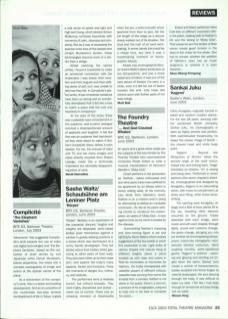Mnemonic first suggested Complicite's shift towards the use of video and digital technologies and The Elephant Vanishes, based on the collection of short stories by cult Japanese writer Haruki Murakami, places projections, live relays and a complex scenography of image and action at the stylistic centre of the piece.
As a reinvention of the company's work, this is a brave and exciting development. And as an evocation of the multimedia non-stop sensory bombardment of life in Tokyo, it gives a real sense of speed and light and high-tech living, which director Simon McBurney contrasts beautifully with moments of calm, slowness and simplicity. But as a way of accessing the peculiar inner lives of the people who inhabit Murakami's stories, these technologies become more of a barrier than a bridge.
Whilst watching the stories unfold, I found it impossible to make an emotional connection with the characters: I was shown their emotion and their anguish and their shifting sense of self, but I was unable to feel how they felt. In Complicite's earlier works, these emotional narratives have been so strong and so wonderfully dramatised that it felt like a loss to watch a piece that felt cold and heartless in comparison.
At the start of the show, there was a palpable wave of excitement in the audience, and a comic prologue received a disproportionate amount of applause and laughter: it felt like this was an audience that had decided they were about to watch A Brilliant Complicité Show, before it even started. For me, the overuse of video and TV, and too many images and ideas directly recycled from Robert Lepage, made this a technically impressive but ultimately disappointing piece of work.

